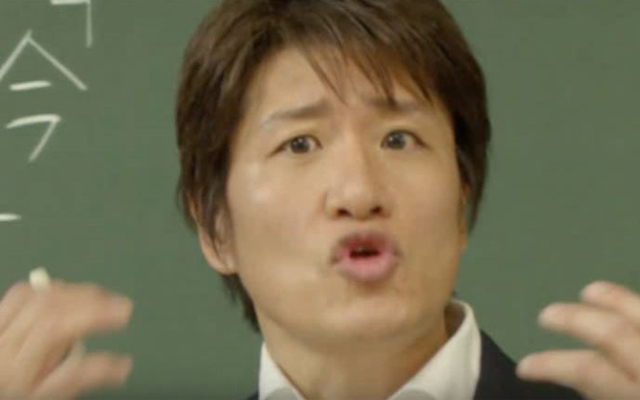
Source: YouTube
Esteemed Japanese Teacher-Celebrity Blasts Unmotivated Youth: “Studying Is A Luxury!”
- Source:
- 林 修(東進衛星予備校の現代文講師)さんの今すぐできる45の自分改造術より / Corobuzz / @sdvx_in / Jin / @limp_biscuit_09 / 乙武 洋匡(おとたけ ひろただ)さん いじめについて
- Tags:
- Education / Hayashi Osamu / Hirotada Ototake / Japan / Kids / Schools
Related Article
-

These Realistic Puffy Bunny Pouches Are The Most Adorable Way To Store Your Goodies
-

Cat duo in Japan digs into miniature luxury traditional New Year’s feast fit for humans
-

Anteater At Japanese Aquarium Proves That There Is No Bridge Too Far For Food!
-

Japanese photographer’s colorful photos show “rainy day dolls” look good even on sunny days
-

Komeda Coffee releases mouthwatering trio of beefy short rib burgers
-

Watch an Escalator in Japan Transform into a Wheelchair Lift


"If you don't like it, just quit. Studying is a luxury." Those were the words that celebrity educator and television personality Osamu Hayashi chose to open his salvo against unmotivated students in Japan that is now drawing a round of applause from Japanese internet commentators.
Osamu Hayashi is perhaps Japan's most famous juku (cram school) lecturer, having taken on a role of respected television personality to be consulted on matters of education, and gaining popularity via commercial appearances backed by his catchphrase "Ima desho!" ("It's now or never!")
Perhaps it is his experience as a prominent figure in Japan's cram school system that allowed him to so harshly voice frustration with unmotivated students who lack the discipline to study. On the April 3rd broadcast of "Hayashi-sensei ga odoroku hatsumimi-gaku" (林先生が驚く初耳学), or "Professor Hayashi's School of Surprising Second Hand Knowledge", Hayashi was asked "What do you do to raise the motivation of students?" Hayashi was blunt in responding, calling upon the words of a university seminar lecturer who inspired him:
The message seems to be that academic learning is wasted upon students who cannot be appreciative of an opportunity to better themselves, both for individual gain and support of their families. While very harsh, it has resonated with thousands of Japanese people, with many re-tweeting screen-captures saying:
Of course, it's not a message that agrees with everyone. The loudest argument of opposition being summed up in this tweet below, that reads: "That's wrong. It's not "we're paying for it so do it", a society that labels people who don't study well as useless is at fault. People who don't do well in school should be encouraged with other hobbies, as just forcing them to study is pointless and they won't be a service to society."
It's a counterpoint not without its support, either. Just last February famous educator and best-selling author Hirotada Ototake ripped the drone-like training of the Japanese education system, calling Japanese schools "factories for salarymen" that would have stifled the creative entrepreneurship of Bill Gates and Steve Jobs. The lack of variety of learning methods and approaches he critiqued Japanese schools for, is perhaps tied to the cram school system that Hayashi finds himself trying to rid of unmotivated students.
Source: YouTube
At first glance, Hayashi's point is harsh but truthful (although as someone pitching cram schools as a business model, what else would he say?), and there is still plenty of merit in them. A student who can't apply himself or herself in class despite not really wanting to be there (as well as their parents' care and financial backing), and lazily treats school as a cruel Herculean labor is unlikely to be rewarded by the academic system.
Perhaps, however, that system is only offering salvation for one type of student. Students flush with artistic and creative depth may not successfully make it through a system that relies on parroting teachers and not engaging themselves in different methods of learning to search out their true talent and potential.
While there is certainly no shame in applying oneself to working towards a career path strictly through the rigors of academics, you eventually have to wonder just how many truthfully unmotivated delinquents created the sentiment of "if you aren't motivated, quit", and how many potential leaders and visionaries lost their motivation because of it.